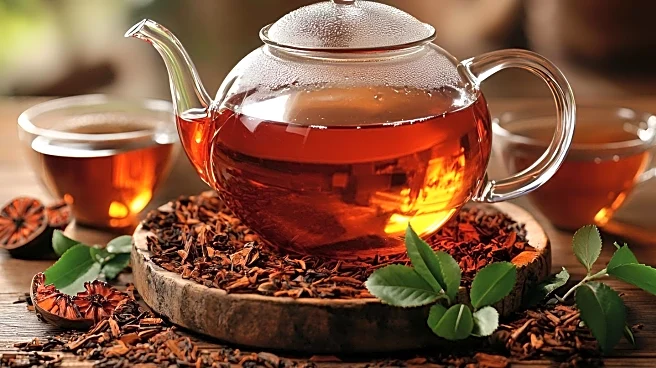What's Happening?
A recent analysis by nutrition experts has revealed that several teas surpass green tea in antioxidant content, offering diverse health benefits. While green tea is renowned for its catechins and flavonoids,
teas such as matcha, black tea, white tea, and rooibos provide equal or higher levels of antioxidants. Matcha, in particular, leads the pack due to its use of whole powdered tea leaves, containing up to 945 mg of antioxidants per cup. These teas offer unique health perks, including heart and gut support from black tea, skin protection from white tea, and caffeine-free calm from rooibos. Antioxidants are crucial for neutralizing free radicals, which can damage cells and cause oxidative stress, potentially leading to chronic illnesses. Experts like Jamie Baham, MS, RDN, LD, emphasize the importance of antioxidants in promoting cognitive function, heart health, and overall longevity.
Why It's Important?
The discovery of teas with higher antioxidant levels than green tea is significant for public health and nutrition. Antioxidants play a vital role in reducing the risk of chronic diseases such as heart disease and cancer by neutralizing free radicals. This information could influence consumer choices, encouraging a broader range of tea consumption for health benefits. Nutritionists like Amy Woodman, RD, highlight the potential for these teas to improve cognitive function, heart health, and blood sugar management. As consumers become more health-conscious, the demand for antioxidant-rich products may increase, impacting the tea industry and related markets.
What's Next?
As awareness of the health benefits of these teas grows, it is likely that consumer demand will shift towards these varieties. Nutritionists and health professionals may begin recommending these teas more frequently, potentially influencing dietary guidelines and public health recommendations. The tea industry might respond by increasing production and marketing efforts for these antioxidant-rich teas. Additionally, further research could be conducted to explore the specific health benefits and applications of these teas in medical and wellness contexts.
Beyond the Headlines
The emphasis on teas with high antioxidant content reflects a broader trend towards natural and plant-based health solutions. This shift may encourage more sustainable agricultural practices and increased interest in traditional and herbal medicine. The cultural significance of tea in various societies could also be highlighted, promoting cross-cultural exchanges and understanding through shared health practices.










